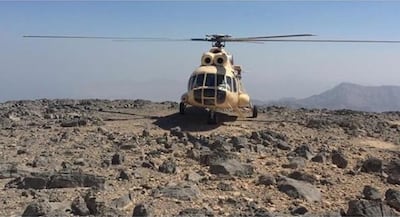Adventure enthusiasts risk serious injury and even death if they do not carry enough water and stray off marked UAE mountain trails, experienced hikers said.
Their message came a day after a civil defence officer in Ras Al Khaimah led eight hikers to safety in an overnight rescue.
Emirati Youssef Al Habsi was praised by authorities after he spent hours tracking down the hikers stranded in the Wadi Naqab mountains and lowered them to safety by rope at sunrise on Saturday.
“He was called for help since he comes from the same area and is very familiar with it,” said Brig Gen Mohammad Al Zaabi, director of RAK Civil Defence.
Mr Al Habsi, a first assistant with the squad, found the men at 1am on Saturday, nine hours after he started the search.
“Since it was dark, he stayed with them until dawn and then used ropes to help to bring the men to safety,” Brig Gen Al Zaabi said.
The UAE's mountains are a tempting prospect for many adventurers. More people are taking staycations because of coronavirus restrictions.
Rescue teams regularly warn hikers of the dangers – especially during the UAE's searing summer heat.
Brig Gen Al Zaabi said rescue efforts are regularly conducted by the civil defence team.
Authorities have frequently warned hikers to use guides instead of venturing out on their own.
How to stay safe in the mountains:
November to mid-March are ideal for hiking before temperatures climb
Beginners should not hike when temperatures rise above 35°C
Stick to properly maintained hiking trails
Fitness in the gym does not mean you can take a tough hike
Stay cool with loose-fitting garments to avoid direct sunlight. Exposure of skin with sleeveless T-shirts and shorts adds to dehydration
For a weekend hike, start drinking extra water from Monday to get your body hydrated. For a three- to four-hour hike, carry a litre of water for each hour.
Discuss your route, and the estimated time you will return to your car, with someone who is experienced and inform them when you are back
Faisi Shalmani, founder of AFT Outdoor Adventures, said that with temperatures set to climb over the summer, beginners should never underestimate the terrain.
"This season, almost every weekend there is a rescue. Sometimes two or three rescues happen over a weekend," said the Emirati, who is a member of a volunteer force that helps search for lost hikers. He was not involved in the weekend search.
“Right now, people are eventually being found even if they are in the mountains for 13 to 15 hours and rescued the next day. But when the temperature switches from 24°C to above 34°C, it will bring bad news for these lost hikers.”
He advised newcomers to avoid hiking in summer.
Those who want to stay active should stick to short, well-marked trails and complete the trek by sunrise in the summer.
“The one thing that can save someone’s life in these mountains is water," Mr Shalmani said.
"You must also stick to a plan. If you plan a hike of three hours, do not go over this.
"It is important to discuss your route and the time you plan to return with someone you trust.”


